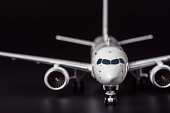Case Examine on Private Airline Companies: Tendencies, Challenges, And…

본문

Private airline companies have emerged as important players in the aviation industry, offering tailor-made services that cater to the wants of affluent travelers and businesses. This case research explores the panorama of private airlines, inspecting their operational fashions, market tendencies, challenges, and opportunities for development.
Background
The private airline sector has grown exponentially over the previous two many years, driven by growing demand for personalised journey experiences, time efficiency, and adaptability. Not like industrial airways that operate on fastened schedules and routes, private airlines offer charter providers, fractional ownership, and jet card programs, permitting prospects to tailor their journey plans in response to their preferences.

Market Trends
- Progress in Wealth and Enterprise Journey: The rise of excessive-net-price individuals (HNWIs) and the expansion of worldwide businesses have significantly contributed to the demand for private air travel. In accordance with a report by Wealth-X, the number of billionaires worldwide has reached an all-time high, creating a bigger customer base for private airlines.
- Technological Advancements: Know-how has performed an important position within the evolution of private airlines. Improvements similar to advanced booking platforms, cell apps, and enhanced in-flight services have improved buyer expertise. Furthermore, the combination of knowledge analytics permits airways to optimize routes and handle operational effectivity.
- Sustainability Initiatives: As environmental concerns grow, Private airline companies private airlines are adopting sustainable practices. Many companies are investing in gas-environment friendly aircraft and exploring various fuels to reduce their carbon footprint. Initiatives comparable to carbon offset applications are additionally changing into well-liked amongst private airline operators.
- Health and Safety Protocols: The COVID-19 pandemic has reshaped the aviation trade, with private airlines experiencing a surge in demand due to perceived safety advantages. Enhanced health protocols, such as thorough cleansing procedures and reduced passenger capability, have made private journey more interesting to well being-acutely aware travelers.
Operational Models
Private airlines operate beneath various models, each catering to completely different segments of the market:
- Charter Services: This model permits customers to rent an aircraft for a particular trip. Charter providers are flexible and can accommodate numerous group sizes, making them standard amongst companies and families.
- Fractional Ownership: On this model, a number of owners share the costs and usage of an aircraft. Fractional ownership appeals to people and firms that require regular access to private jets without the complete financial burden of ownership.
- Jet Card Packages: Jet cards offer prospects a pay as you go possibility for a sure number of flight hours on private jets. This model provides flexibility and comfort, allowing travelers to entry private aviation companies without the commitment of possession.
Challenges
Regardless of the growth and opportunities throughout the private airline sector, a number of challenges persist:
- Regulatory Hurdles: Private airlines face complex regulatory environments that range by nation. Navigating these laws could be time-consuming and expensive, impacting operational effectivity and private airline companies profitability.
- High Operational Prices: The costs associated with sustaining a fleet of aircraft, hiring skilled personnel, and making certain compliance with safety laws can be substantial. Private airlines should balance these costs while remaining competitive in pricing.
- Market Competition: The private aviation market is changing into increasingly competitive, with both established players and new entrants vying for market share. Differentiating companies and sustaining customer loyalty are critical for fulfillment.
- Economic Fluctuations: The private airline trade is delicate to economic conditions. Financial downturns can result in diminished travel budgets for companies and people, directly impacting demand for private air travel.
Alternatives for Progress
Regardless of the challenges, a number of opportunities exist for private airline companies:
- Increasing Markets: Rising markets, notably in Asia and Africa, current important growth alternatives. As wealth will increase in these regions, the demand for private air travel is expected to rise.
- Partnerships and Alliances: Collaborations with luxury manufacturers, inns, and journey companies can enhance customer experience and provide further income streams. Strategic partnerships can also assist private airlines increase their attain and visibility.
- Progressive Services: Providing distinctive companies, reminiscent of personalized in-flight experiences, gourmet catering, and bespoke journey itineraries, can entice discerning travelers. Airlines that prioritize customer experience are possible to face out in a crowded market.
- Technological Integration: Leveraging expertise to boost operational efficiency and customer service will probably be paramount. Investments in artificial intelligence, machine learning, and knowledge analytics can provide a aggressive edge.
Conclusion
private airline companies - karjerosdienos.vilniustech.lt - play a vital position in the aviation trade, providing personalised journey solutions that cater to the wants of affluent travelers and companies. While the sector faces challenges such as regulatory hurdles and excessive operational prices, the alternatives for progress are substantial. By embracing technological advancements, expanding into emerging markets, and specializing in customer expertise, private airlines can navigate the complexities of the trade and thrive sooner or later. As the demand for private air travel continues to rise, the potential for innovation and success inside this sector remains promising.

댓글목록0
댓글 포인트 안내